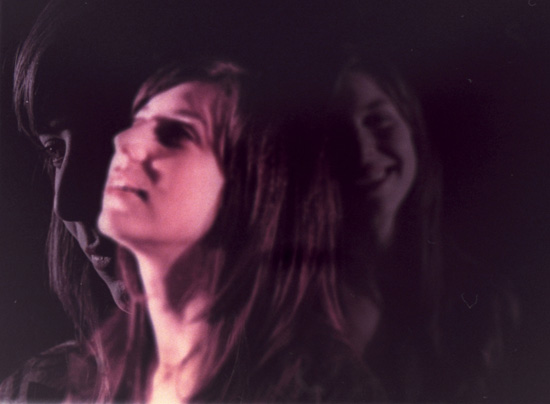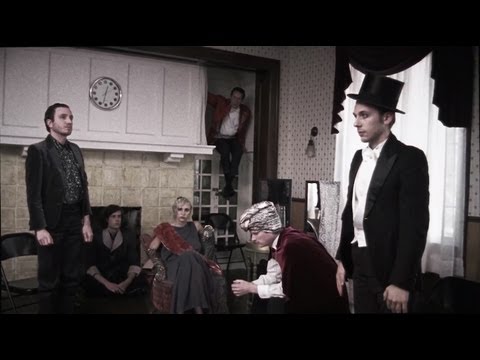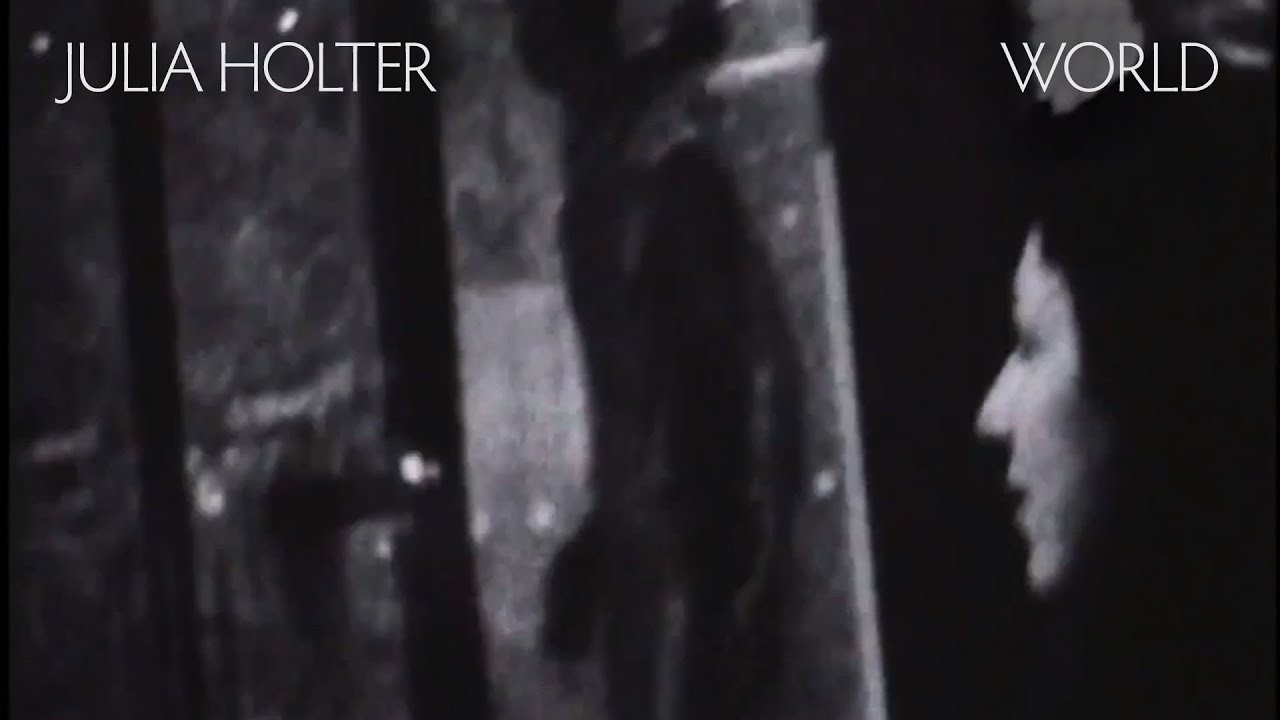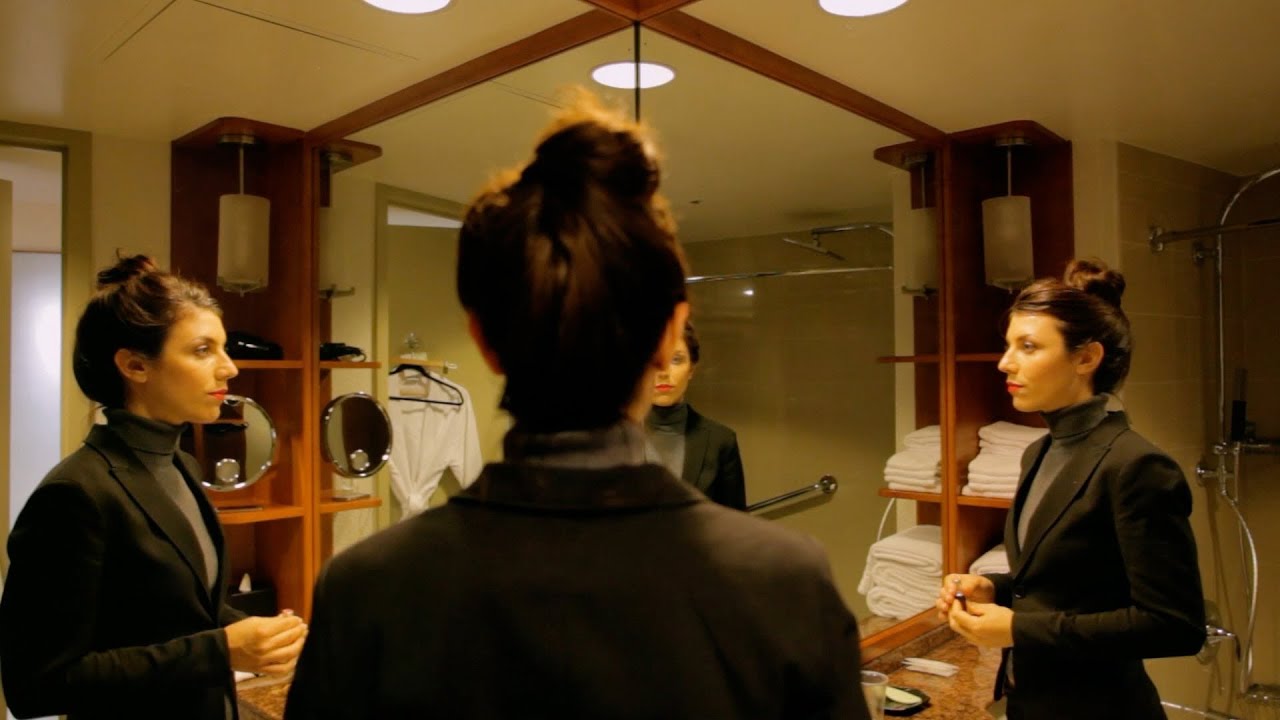The cover art for Julia Holter’s recently released Loud City Song is a composite of several photos of the brunette musician, layered to look blurry and obscure any direct shot of her face. This image, in which a tiny, shy Holter retreats within the face of a bigger version of Holter, one eye looking skyward, is a lovely visual metaphor for her music, which features looping and stacked additional sounds – many taken from real life, such as the sound of Holter playing tag on a rooftop – leaving the listener with the impression that there might be several Julia Holters behind the album.
Not that such a theory would be preposterous, given Holter’s quick emergence from obscurity to international media attention thanks to her quick succession of albums, which started with 2011’s Hippolytus-inspired Tragedy, was followed by the more modernist Ekstasis a year later, and is capped off for now with Loud City Song, a work largely inspired by the musical Gigi (and Colette’s novella of the same name). On this third album, Holter continues to draw on the music that inspired her during her university years of classical composition, but also reaches outside herself to the concept of loudness, the apathy of city life and of coming of age. Add to that a love story twist, and you have Holter’s most ambitious and accessible work yet.
The Quietus caught up with Holter to find out what gave her difficulty in music school, her own coming of age and just what that love story is.
Aside from John Cage, who you’ve mentioned in a Quietus interview before, which composers really spoke to you while you were studying composition, and why?
Julia Holter: Robert Ashley, I love how he uses the voice. And how the musicians he works with use their voices in a really ‘Robert Ashley’ way. It’s like you hear his voice even when he’s not there, speaking/singing himself.
Also Morton Feldman, maybe, and early music composers like Josquin and Machaut, all for similar reasons – music that is sublimely beautiful and yet doesn’t ‘develop’ in the way that classical music does, all times, allowing one to not be in that moment, in a way. Not dictating to you a direction. That was something I always had trouble with in music school – having to develop ideas in a goal-oriented way, i.e. here’s the exposition, here’s the development, here’s the recapitulation, etc. Even in ‘contemporary music’ situations, at least when I was in school ten years ago, I was expected to make music in that kind of way.
In a short time, your music has already changed a lot. What aspects do you think will always be elements of your music?
JH: Well, I love working with the voice, I love mystery, I love creating atmosphere. So I suppose those are three things I can expect always. At least now. But maybe I will make much more logical music in the future, and the mystery will disappear! [laughs] No, but seriously, even if I move away from using my own voice, I still have this kind of metaphysical idea that there will always be a voice in my music, whether it’s someone’s voice or not.
Tragedy was inspired by Hippolytus, your new record was heavily inspired by Gigi the musical and Ekstasis took a lot of lines from writers like Frank O’Hara and Virginia Woolf. At what point does an idea grow into a full-fledged album concept?
JH: Well, Ekstasis never really had an overall concept, and I won’t always have one. But Tragedy and Loud City Song do. It happened very quickly to me, the moments that I realised I could make an entire album inspired by Hippolytus, or by the musical Gigi. In both cases, I just knew from the moment the ideas occurred to me that I would be able to do something with these stories. Because there were dynamics between characters and in the settings that allowed a lot of wiggle room for me to play with.
With Gigi, it was something I wasn’t particularly proud of doing – building an album off a musical is a weird idea for me, as I’m not really into musicals usually – just like with Tragedy, I felt self-conscious about doing something based on a "great work of the past", and I still do feel a bit this way. But I knew it would be so effortless for me to come up with ideas for songs inspired by that musical, because I grew up with it, and the imagery was so deep in my mind. Also, I had recently read the Colette text, and that gave a lot more depth to the fascination with Gigi I always had as a child. It’s always about what you can do best, whether or not it deems you the coolest or the most innovative. The moment I read some of those amazing lines from Hippolytus, like "I can see you but my eyes are not allowed to cry", I just was dying to make something around that, it was so effortless as an idea. Of course the actual undertaking is never easy, but you have to allow yourself to do what you are most inspired to do.
For Tragedy you said you had a lot of drawings that you did even before the music was written. Did you do any drawings or visuals this time around?
JH: No, actually, because the film itself did that for me. I think that’s why. But you will notice that I got my friend Yelena Zhelezov to make some drawings after the record was finished, and they are the inserts inside the record and CD.
Can you talk some about the concept for the ‘In The Green Wild’ video?
JH: Yelena can! That is her video, and I usually let video artists just do their thing with a song, regardless of what I’m doing in the song. But she did play on some of my ideas for sure. ‘In The Green Wild’ is kind of about escaping one’s oppressive world, losing oneself in another world. She was working with this idea of the outsider, the person trying to find his/her place. So the guy in the video is unsuccessfully looking for a partner in games of musical chairs and dancing, and meanwhile there is also this audience vs performer thing. All dynamics present in the album.
What about ‘World?’
JH: ‘World’ the song is kind of a journal of a person looking out into his/her city, thinking about how it relates to them and reflecting on the themes addressed later on in the record. It’s kind of personal and intimate. It’s like the reason I am inspired by Frank O’Hara’s poem about the city here is because his observations of the city always feel so personal, and even romantic. Like, he describes things he sees, but they aren’t even real-seeming, they are like extensions of his own thoughts. So the video itself needed to feel like documentation of the city but from one’s own mind, with all of the bias and distortion of one’s emotions and thoughts. I knew Rick Bahto was perfect at this, whenever I see his work, it’s haunting because it is simple in one way, but so full of emotion and chaos at the same time. You look at a chair but you feel so much emotion. It was perfect for the song.
You’ve done two very different versions of ‘Goddess Eyes’ and two very different versions of ‘Maxim’s’. Do you think you’ll keep this up for your next record?
JH: [laughs] No, not necessarily. Those things just happened, and for different reasons.
You’ve talked about Loud City Song having to do with coming of age, and you’ve also brought up the concept of loudness. How do you relate loudness to coming of age?
JH: Hmm, I don’t know, they aren’t directly related, but in the case of this story, there is someone young feeling bombarded by a loudness – real or symbolic – and wanting to escape. But clearly, if they are young, the loudness is bigger than her and she can’t easily escape, so it’s a struggle, and there is then the question, will I just learn to live with it in harmony?
We live in a very loud world now. I myself am not the child coming of age – I don’t think! – and I’m not grumpy about the loudness, but I’m curious about it. And it’s very easy to place a character in today’s world who is disenchanted with it and running away, because loudness can be claustrophobic. Like in the past, they used to say [that] with the industrial revolution there came this new machine noise to the atmosphere. So now we have, in addition to that, the noise of our smartphones, the ads on TV that are way louder than the actual shows, and engineers have said that the average top 40 hit these days is distorted and has so much less frequency range than in the past. The feeling you get from the Gigi character is that she is trying to figure out why she doesn’t understand society, and you get the sense it is ‘loud’ to her, that she is bombarded by it and she is running away from it.
What was your own coming of age like?
JH: It was fine, actually. In regards to the stuff discussed in Gigi and Loud City Song, I would say I actually wasn’t very disenchanted with society – though, as with everything I do, the sentiments expressed in my songs are always stemming from ones I have felt, whether or not they share the same stimuli. It’s impossible for me to do something without feeling it. But for me, it was more of an inward battle, because I’m naturally insecure, like a lot of musicians and creative people. I mean, I definitely had some troublesome parts, struggled with a small amount of depression and confusion, which actually started early, like around nine or ten. I would actually say nine and ten were harder for me than teenage years, because those were the years I realised the universe was endless and that "nothing matters". Maybe the worst part of that realisation is that you realise you are a prisoner of your own thoughts, and you realise how much you can convince yourself of, just on your own, and it can lead you down a dark path.
And then I might further that and say that post-teenage years – 19, 20, 21 – were also very difficult, because you feel you are supposed to have mastered the ability to tame your thoughts and free yourself, but in truth you haven’t and never will. Once I started enjoying my own music, though, I think I was able to free myself from this a bit. That happened around 22. I’ve always had a good amount of love in my life though, and I didn’t have a rough time, despite all the possibilities for things to go wrong at those ages.
There have been a lot of books and movies that critique consumerism. I’m thinking of some moments in Edith Wharton and the original Kubrick version of Lolita, to name two. What made Gigi‘s take on consumerism stand out for you?
JH: Well it’s easy to criticise the evils of consumerism, because it’s not at all morally-based. And, from Holden Caulfield to Gigi or whatever, you always have the young ones growing older acting in defense of the pure, reacting against the viciousness of society and the superficiality of it, trying to get back to the goodness of childhood. And who doesn’t understand that need? But it seemed like wow, this is even easier these days, when advertising rules the world. So it was kind of impossible for me to not think about for a moment, at least in regards to the superficial reality TV show world and the branding of individuals, but I also didn’t emphasise the consumerism issue in the actual record. It’s something I mention as a tangent in discussions about the record, but it’s not central. In the actual record there is more about the individual vs. society in general, [rather] than a political issue, although it can be interpreted differently, I guess.
There is a love story in Gigi. Is there a love story on Loud City Song?
JH: Definitely! It is basically a love story. There are the songs that search for love and there are the songs that finally are able to dwell on love, move around in it and see what’s up with it (‘Hello Stranger’, ‘He’s Running Through My Eyes’ and, most intensely, ‘City Appearing’). For example, in ‘Horns Surrounding Me’, someone is searching for love and intimacy and quiet and only finding noise and superficial lust. And in ‘He’s Running Through My Eyes’, someone is very honestly addressing the vulnerability of true love. In ‘City Appearing’, love is not so much on an individual level, but more symbolic – it’s sort of found by the whole city, kind of an apocalyptic orgy. The city is set on fire by this communal love, in a way. It’s not a real event. Almost like maybe Gigi has this realisation about love and it causes her to have this dream. Or maybe it’s real but it doesn’t matter, listeners can interpret it how they wish. But love and intimacy is really the thing being yearned for throughout the record.
On the subject of Gigi, I know you once wrote a long poem in relation to Colette’s novel of the same title and story. Did that feed your inspiration for this album at all?
JH: No, not directly, it was a while back. I mean, I dealt with the same basic issue – Gigi is disenchanted with what society expects of her, wants to do things her own way, and has this issue with love and her mother too, who is never around – but stylistically it’s very different. If I can even remember it. It was the same issue then as it is now, for me, just that it was so easy for me to write about because I knew the character so well. I grew up with her.
It’s funny also how poems on their own are very different from lyrics. I mean in a way ‘City Appearing’ and ‘World’ are poems on their own, because I wrote the lyrics first and then the music. But in that case you always adjust the lyrics a bit to fit with the music, because in songs what happens, I think, is that the lyrics become music and are no longer words. They are something else. And with poems, you have a different situation. They are still words.
Do you want to write musical theatre? Do you think you will?
JH: [laughs] I don’t know! I actually don’t know much about musicals, I just like Gigi because my grandma had it on VHS in her house when I was growing up. I would love to work with film or (musical or non-musical) theatre though, for sure.
You’ve talked about using mesotics to write lyrics. Can you give some examples of mesotics you use?
JH: Here is one [‘I Would Rather See’].
How important are lyrics to you? Would you ever do wordless vocals like Lisa Gerrard or Julianna Barwick?
JH: It’s tricky for me – in one way wordless vocals are very much part of my practice, because what I do a lot is intuitively come up with a sound with my mouth and it evolves into a word eventually, for every word. I think a lot of musicians do this. In fact, I’ve seen it happen. You come up with a group of sounds that go well with what you’re playing on piano and they lead into a phrase, based on their sounds! Really interesting. I think that process of morphing into actual words with meaning is too fun for me to neglect, usually.
I love Julianna Barwick’s music and I listen to Cocteau Twins almost every day though, so it’s not really an issue I have with other music. In fact, I think a lot of times as a listener it’s easy or more fun to ignore lyrics because, like I said above, lyrics become music, and no longer words really. But sometimes the way a lyric will set with its melody is so touching and I just love sentiments that are a united force of meaning and sound, almost more than anything.
I’ve been listening to that beautiful cover record Cat Power did and when she sings "run to me" in ‘I Found A Reason’, it’s really killer and I want to cry. Or like when Prince screams "I WANT YOU" at the end of ‘The Beautiful Ones’. Just like the simplest, most touching moments, I love. And those come when you have the simplest sentiment with a little meaning there too, more than just pure sound. It’s just for me as a writer, maybe it’s part of the inspiration for me to play with words, even as they become non-words eventually. Because there still will be some interest in meaning in the end. As much as I love magic, I also love the play with meaning.
You’ve just finished a tour. Are you happy with how your music translates live? What do you think your future shows will be like?
JH: Yes, I love doing live shows. I don’t know what future shows will be like but in general I try to perform the songs live the best way possible, which tends to mean they don’t sound exactly like on record. I don’t consciously try to make them really different, but I just want the songs to thrive as strongly as they can on a stage with five musicians (or however many I have at the moment), so they tend to be arranged just slightly differently because in recording you have the crutch of unlimited amounts of tracks and layers.
Do you feel like you’ve created an onstage persona at all?
JH: No, not one persona. I always go to another place when I perform, but it’s never one particular character – it’s more like every song has a different character, and those change according to the mood of the show. I improvise the characters really! Every show is different. I’ve realised how intensely the audience matters. After opening for Sigur Rós and playing certain festivals, I’ve seen larger audiences, and the more variety of audiences I have, the more I see how much the audience matters!
Julia Holter’s Loud City Song is out now on Domino





